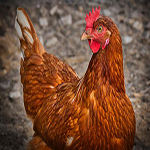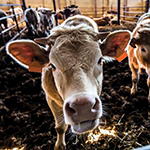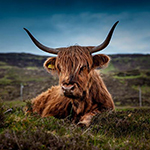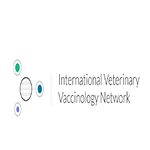World Veterinary Day – celebrating the value of vaccination
Vaccines for rabies, chicken disease, cattle, E. coli and more at The Roslin Institute and the Royal (Dick) School of Veterinary Studies.
The theme of this year’s World Veterinary Day is “Value of Vaccination”. To celebrate it, we have put together some of the vaccinology work conducted by researchers at The Roslin Institute and the Royal (Dick) School of Veterinary Studies (R(D)SVS).

An oral dog vaccine against rabies
Vaccines hidden in dog food could help curb the spread of rabies in countries with large populations of stray dogs. Experts say the approach could help to vaccinate millions of street dogs around the world that are often responsible for spreading the disease to people. Three times as many dogs could be vaccinated each day when the new process is combined with existing injectable techniques. Experts from Mission Rabies, the Worldwide Veterinary Service, The Roslin Institute and R(D)SVS assessed the feasibility of the approach in Goa, India.

Vaccine shows promise against widespread chicken disease
A new vaccine strategy could offer protection to millions of chickens threatened by a serious respiratory disease. Infectious bronchitis virus is highly contagious and responsible for major economic losses to the poultry industry worldwide. Infected chickens experience weight loss, decreased egg production and impaired egg quality. They are also left vulnerable to other diseases. Researchers at The Roslin Institute and the Pirbright Institute tested a new approach using a specialist type of vaccine – known as recombinant virus vaccines. These vaccines use harmless or weak versions of a virus or bacteria to introduce microbes into cells in the body. Results show the vaccine offered partial protection against infectious bronchitis virus, but further research is needed to develop a more robust vaccine.

Vaccines against bovine tuberculosis
Our researchers are developing new vaccines against a devastating cattle disease. Bovine tuberculosis (TB) is one of the biggest challenges facing the cattle farming industry today, particularly in the West and South West of England. Further understanding of the basic bioscience underpinning the disease and the mechanisms whereby vaccination induces immune protection in cattle will lead to a step-change in bovine TB treatment and eradication.

Vaccine trials against E. coli
We are part of a research consortium who worked to understand how common E. coli O157 is across farms in Great Britain and used sequencing approaches to determine how these bacteria relate to the ones causing human infections. They have made advances in development of a vaccine for use in cattle that now needs assessment in large-scale field trials. Modelling indicates that such an intervention would have significant public health benefit.

The International Veterinary Vaccinology Network
Researchers at The Roslin Institute and Pirbright Institute lead a network to develop livestock vaccines. The International Veterinary Vaccinology Network has been awarded £2.1M by the Medical Research Council and the Biotechnology and Biological Sciences Research Council to facilitate the formation of new partnerships that will contribute to the development of vaccines against livestock diseases that have major impacts on the health and productivity of animals in low-and-middle income countries.

Clinical services on campus
Within our clinical hospitals we offer a full vaccination service to our clients, as part of a comprehensive programme of preventative health care. We also work with local charities to provide vaccinations for rescue animals. Our student run charity All4Paws offers free veterinary care, including vaccinations, to the pets of people in Edinburgh who are homeless or vulnerably housed.
Vaccination is fundamental to protect the health of animals and prevent diseases from spreading. At the Royal (Dick) School of Veterinary Studies we are privileged to have the expertise to develop novel vaccines and to establish field protocols to ensure optimal vaccination coverage in low resource settings.
For practical guidance on vaccination for animals, please visit the website of the R(D)SVS’ clinical services: https://www.ed.ac.uk/vet/services.
** The Roslin Institute receives strategic investment funding from the Biotechnology and Biological Sciences Research Council and it is part of the University of Edinburgh’s Royal (Dick) School of Veterinary Studies. **
Related links
Oral dog vaccine could help beat rabies
Vaccine shows promise against widespread chicken disease
New funding to accelerate the eradication of bovine tuberculosis
Study could explain higher rates of human E. coli infection in Scotland


